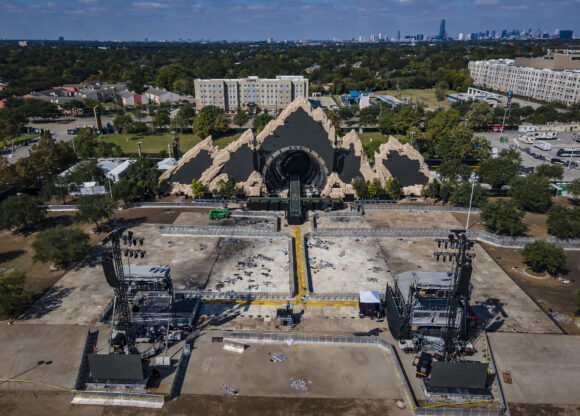The Texas Task Force on Concert Safety (TFCS) presented a report to Gov. Greg Abbott on April 19 detailing safety recommendations for future events in the wake of the November 2021 Astroworld Festival tragedy.
Abbott formed the TFCS Nov. 10, 2021, five days after the Astroworld Festival in Houston where a crowd surge caused 10 fatalities and more than 300 injuries.
The TFCS held five group meetings. The Texas Music Office (TMO) invited established experts in the fields of concert promotion, public safety, first response and government permitting. Each meeting featured presentations from experts on event promotion and crowd safety, general discussion, and included time for question-and-answer sessions.
The TFCS said the meetings and one-on-one discussions produced released five recurring themes:
- Unified On-Site Command and Control
- Permitting
- Training
- Planning with Risk Assessment
- Centralized Resources
For the first finding, Unified On-Site Command and Control, the TFCS identified that “the ultimate function of a centralized on-site command and control group is to establish authority and process for pausing or canceling a show in response to a safety incident.”
“The TFCS strongly supports a requirement that event promoters determine which EMS/Fire/Police agencies would respond to a 911 call on the site of their event and that those agencies be employed as UCC members,” the report said. “Support security from other jurisdictions can be allowed but should not replace inclusion of local response agents. Preshow collaboration with these entities is needed to strengthen communication during a crisis.”
The second finding, Permitting, addresses the need for for permitting events in unincorporated areas of Texas. The task force found that Houston County had jurisdiction over the permitting requirements, but Houston City 911 was responsible for responding to event incidents. The TFCS found there no occupancy load issued for the event, which is typically determined by the fire department.
“A consistent permitting process could have helped established jurisdiction and authority over ultimate event shutdown in the face of a life-threatening incident,” the report said.
“The TFCS discussion revealed that the permitting process is inconsistent across the state, which can lead to forum shopping by event promoters seeking certain permitting requirements. To establish a statewide baseline, the TFCS recommends implementation of a universal permitting template. This template would be informed by those counties that have historically hosted successful events and could provide guidance on what is statutorily required in permit applications. The template would serve as a “floor not a ceiling,” allowing for local issuers to add relevant information according to the area and type of event.”
Finding No. 3, Training, led the TFCS to conclude, “Public and contracted security and event staff must have adequate training for each specific event. A series of preshow steps, such as tabletop exercises, site walkthrough drills, security briefings before and after shifts, establishment of a clear and well- disseminated communication tree, and agreed-upon show-stop triggers and responses are some of the elements of successful event protocol.”
For the fourth finding, Planning with Risk Assessment, the TFCS said Astroworld required unique contingency plans as it occurred in a parking lot versus a traditional venue.
“For these manufactured events, there is a serious safety risk if venue borders are susceptible to a breach that results in unauthorized entrance to the grounds, and especially into sections reserved for first responders,” the report said. “This influx of people can overwhelm even a well-planned event’s security and staff and may result in the introduction of contraband not screened at designated entry points.”
The TFCS recommended the use of barricades, which can “do the work of staff by guiding attendees into rounded areas with forward and backward egress, rather than angular areas where people can get trapped.”
The task force encouraged local responders to have an established communication tree and agreed-upon conditions for the transfer of authority from event staff to responding agencies in the event of an emergency.
For Finding No. 5, Centralized Resources, the TFCS said received a large collection of resource documents that informed many of the recommendations laid out in the above sections.
The TMO said it will host these resources on its website as part of the Event Production Guide.
Was this article valuable?
Here are more articles you may enjoy.



 Florida Engineers: Winds Under 110 mph Simply Do Not Damage Concrete Tiles
Florida Engineers: Winds Under 110 mph Simply Do Not Damage Concrete Tiles  Insurify Starts App With ChatGPT to Allow Consumers to Shop for Insurance
Insurify Starts App With ChatGPT to Allow Consumers to Shop for Insurance  Viewpoint: Runoff Specialists Have Evolved Into Key Strategic Partners for Insurers
Viewpoint: Runoff Specialists Have Evolved Into Key Strategic Partners for Insurers  How One Fla. Insurance Agent Allegedly Used Another’s License to Swipe Commissions
How One Fla. Insurance Agent Allegedly Used Another’s License to Swipe Commissions 

